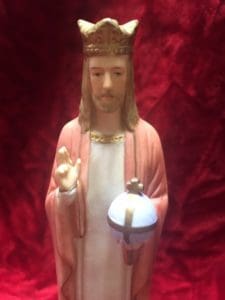The Solemnity of Christ the King is ours to contemplate this week. To help us pray, we share a Franciscan Gospel reflection and questions written by Fr. Paul Gallagher, OFM. They are edited by Franciscan Sister of Christian Charity Sister Anne Marie Lom and Joe Thiel. The excerpts from the Sunday readings are prepared by Joe Thiel. To read or download the complete pdf with excerpts for your prayer, please click here: Franciscan Gospel Reflection November 25 2018. Excerpts from the Lectionary for Mass for Use in the Dioceses of the United States of America, second typical edition © 2001, 1998, 1997, 1986, 1970 Confraternity of Christian Doctrine, Inc., Washington, DC. Used with permission. All rights reserved. No portion of this text may be reproduced by any means without permission in writing from the copyright owner. Please include this information when printing.
Photos: St. Laurentius-Kirche Church, Gieboldehausen, Germany and statue of Christ the King, Franciscan Sisters of Christian Charity Archives
John 18:33b-37
Pilate said to Jesus, “Are you the King of the Jews?” Jesus answered, “Do you say this on your own or have others told you about me?” Pilate answered, “I am not a Jew, am I? Your own nation and the chief priests handed you over to me.
What have you done?” Jesus answered, “My kingdom does not belong to this world. If my kingdom did belong to this world, my attendants (would) be fighting to keep me from being handed over to the Jews. But as it is, my kingdom is not here.”
So Pilate said to him, “Then you are a king?” Jesus answered, “You say I am a king. For this I was born and for this I came into the world, to testify to the truth. Everyone who belongs to the truth listens to my voice.”
Background
This is the last Sunday of the liturgical year. Next Sunday is the first Sunday of Advent. Although this has been the year devoted to reading Mark’s gospel, the text for this Sunday is taken from John’s gospel.
This Feast of Christ the King may feel awkward to those of us who are born and raised in a culture whose roots go back to the rejection of the King of England. The rejection was in protest to his power to impose his will on others, and that sentiment is still part of our culture.
The title “king” also brings to mind a medieval system of royal entitlement at the expense of unfortunate serfs and servants. Even today in our world, royal families live a lifestyle that few of their fellow countrymen can afford. There are still too many places where those of royalty live a privileged lifestyle while the poor continue to struggle for basic survival. Our experience and attitudes toward royalty can affect not only how we hear the texts, but also our openness to the Holy Spirit working within us as we celebrate this Solemnity.
In all the gospels, Jesus has harsh criticism for religious leaders who assume positions and attitudes of superiority. Jesus also rebukes those who see him as the messiah, those who would want to reestablish the greatness of the Hebrew Nation as it was in the days of their great King David. The religious authorities see Jesus as presenting himself as “anointed of God.” Therefore, they see him as blaspheming. They also know that his claim would be a threat to Roman authority, and the threat could disturb the uneasy peace that allows them to function as religious authority while being subjects of Roman rule.
In this gospel, Pilate acts as one who must determine if Jesus is an authentic threat to the Roman authority that he represents. In his questioning, Pilate asks Jesus directly if he is a king. He is asking Jesus if he believes he is the Messiah. One of the ways people expressed their hope and belief in God was through the image of a future kingdom that would restore God’s order and peace to all of creation. Linked to this image of God’s reign is a ruler, one who would govern with the mind and heart of God. That person was understood as the true and only king.
On one level, the gospel text is a dialogue between two people who are attempting to speak to one another, but who have totally different ideas of kingship. Pilate, the governor, is trying to determine if Jesus considers himself to be the King of the Jews. If so, is he a member of the religious fringe, or does he have true political aspirations? Should Jesus and his disciples be taken as a threat to the Roman rule? For his part, Jesus never claims that he is a king, but he does represent a kingdom, the reign of God. God’s realm turns the order upside down. It is built on a ruler who is a servant, one who does not order, but invites; who does not demand to be served, but washes the feet of others; who does not demand that others give their life in service, but instead gives his life for others. In the dialogue between Jesus and Pilate, they are trying to speak to each other, but each is speaking from their unique perspective.
Even though Jesus dies disgraced and suffering, the inscription that hangs over his head on the cross indicates that Jesus was the “King of the Jews.” In John’s gospel, it is often Jesus’ enemies who, although they have no idea of the truth of their words, state the profound truth that John wants his community to understand. In the central section of John’s passion account, Jesus is presented as the king. “Then Pilate took Jesus and had him scourged. And the soldiers wove a crown out of thorns and placed it on his head, and clothed him in a purple cloak, and they came to him and said, ‘Hail, King of the Jews!” (John 19:1)
At the end of each liturgical year the Church closes the year with this Solemn Feast of Christ the King. Throughout the year we have been reflecting on Gospels where Jesus has been revealing to us who God is in word and deed. He has also been instructing us in what it is to be a disciple of Jesus, the one who came to serve the will of God, His Father. Pilate is trying to sort out who this “King of the Jews” is that stands before him. Jesus, even before Pilate, when his life is in jeopardy, is true to his role of being servant of the Father.
Reflection Questions
1. When you think of royalty the images that come to mind are…
2. When you think of royalty, what moments in history or items of contemporary news come to mind?
3. What do you recall of the royal line of David in salvation’s history? What meaning or significance does this have for you?
4. What is your response to people who appear to feel entitled to a lifestyle that is beyond those who make that lifestyle possible?
5. Imagine you are an advisor to Pilate, listening to their conversation. Given the opportunity to approach Pilate and whisper in his ear, you would say…
6. At the beginning of the text, Pilate seems to have the freedom to ask Jesus about his relationship with God and his followers. Realizing that you too have that same freedom, you can now ask…
7. Can you take some time now to talk with God or Jesus about what kind of King Jesus is for you, about the kind of follower you would like to be, or about what this feast means for you in your relationship to God?




